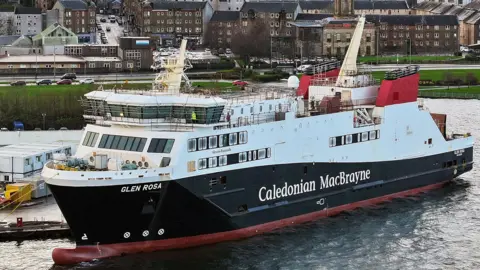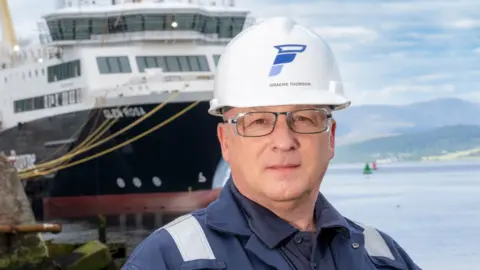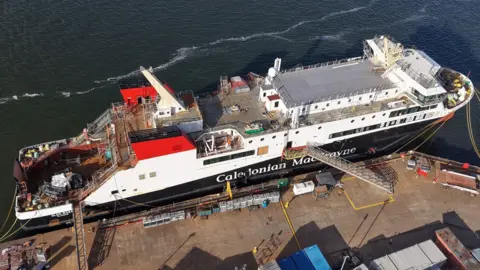Shipyard confirms new delay and cost rise for CalMac ferry
 Getty Images
Getty ImagesThe delivery date for MV Glen Rosa, the second of two dual-fuel CalMac ferries being built by the nationalised Ferguson shipyard, has been put back by up to nine months.
The cost of the ship has also risen - by up to £35m - meaning the two ships will cost upwards of £460m if written-off loans are included, more than four-and-a-half times the original contract price.
Ferguson Marine said it now expected Glen Rosa to be "substantially complete" in the first quarter of 2026 and delivered between April and June.
The ship, which is to serve CalMac's Arran route, was originally due for delivery in July 2018.
MV Glen Rosa was launched from the Ferguson slipway in Port Glasgow a year ago in a far more finished state than its identical sister ship MV Glen Sannox seven years earlier.
While there was much "fitting out" work still to be done, including specialist cryogenic pipework for its liquefied natural gas (LNG) engines, it was hoped it could be delivered by the end of September this year.
Ferguson Marine's newly-appointed permanent chief executive Graeme Thomson apologised "unreservedly" to islanders as he confirmed this was no longer possible.
Mr Thomson told BBC Scotland News the shipyard had put more focus on building its sister ship, Glen Sannox, during 2024 "at the expense of Glen Rosa".
Glen Sannox was finally delivered to its owner, ferries procurement body CMAL, in November after a number of late stage complications with the specialist LNG pipework and commissioning of the engine systems.
Mr Thomson confirmed significant resources had to be diverted from Glen Rosa in order get Glen Sannox into service.
The new chief executive said the previous management made their decision in the environment which they operated in at the time.
"All I can say is, having come to this point and put this marker down, we have to reset there and refocus the team and get this vessel delivered," he said.
"We have got an island community that will be desperately frustrated with this news and we can only apologise for that.
"But we need to ensure that we manage expectations correctly based on what we have ahead and what we have to do."
Revised delivery plan
In a letter to MSPs, Mr Thomson said the cost to complete the Glen Rosa would rise from £150m to £172.5m plus a further £12.5m for contingencies - taking the forecasted cost to £185m.
He told the BBC it was a "huge chunk of money" to pay out for a vessel of its size.
"I'm working on the basis that the £185m is the max," he said.
Mr Thomson said the shipyard would try to identify any opportunities to reduce the projected costs.
Glen Sannox was completed for about £150m but these figure do not include £83m paid out prior to nationalisation, or £45m of government loans that were subsequently written down.
 FMPG
FMPGPressed by the BBC on whether he would guarantee that Glen Rosa would be in service between April and June next year, Mr Thomson said there would be another review in six months when he would be "more comfortable to give a commitment that is firm on the date".
Bill Calderwood, secretary of community group Isle of Arran Ferry Committee, told BBC Scotland's Drivetime programme the delay was "very disappointing but perhaps not unexpected".
He said Arran faced another winter of uncertainty over its ferry services.
"The community are at a loss at what more can be said about the continued examples of mismanagement on this project," he said.
"The programme has gone from delay to delay with little, or no, obvious consequences for the management of the company or others involved in these failures."
Mr Calderwood also said that the island would have a reduced service because the "preferred" port at Ardrossan could not accommodate the new ferries.
"So instead of getting five returns a day we will be stuck down to Troon and, at best, getting three returns a day from each vessel," he said.
"It will have far-reaching impact to the Arran community, to our visitors and to our economics."
 Christopher Brindle
Christopher BrindleDeputy First Minister Kate Forbes said she had communicated her "disappointment and frustration" at the announcement to the Ferguson board.
"It is imperative that that there is no further delay or additional cost to deliver the vessel beyond this point," she said.
"Ferguson Marine's leadership must take immediate and sustained action to restore trust, enforce delivery discipline, and bring this project under control."
Scottish Conservative transport spokeswoman Sue Webber said the government should take responsibility, and that islanders had been "betrayed at every turn by the SNP's incompetence".
She said: "The enormous increase in both the delay and the cost of delivering the Glen Rosa beggars belief – and yet it is totally in keeping with the nationalists' scandalous mismanagement of our ferry network."
Scottish Labour's transport spokeswoman Claire Baker said the SNP had "failed islanders, taxpayers and shipyard workers".
"Scotland's iconic shipbuilding industry is losing out on work because of SNP chaos and the skilled workers at Ferguson's yard are being forced to clean up a mess they did not create," she said.
For the Scottish Liberal Democrats, West of Scotland MSP Jamie Greene demanded an urgent statement to parliament.
"The hard-working staff at Ferguson Marine have been let down by bosses, all paid huge sums of public cash, yet islanders are still waiting on their ferries," he said. "Not a single SNP minister has lost their job over this fiasco."
Design challenges and disputes
The £97m contract for Glen Sannox and Glen Rosa, the first LNG-powered ferries ever built by a UK shipyard, was awarded to Ferguson Marine in 2015, and both ships originally were due for delivery in 2018.
But design challenges and disputes between the shipyard's former owners and government-owned ferries body CMAL led to a stand-off over claims for extra costs.
The shipyard's management maintained that a poorly-developed specification, repeated interference and change requests by CMAL had led to unforeseen complications.
CMAL denied this and claimed the yard's new owners had underestimated the complexity of the project.
The stalemate eventually resulted in Ferguson's going into administration and being taken into state ownership in 2019 with the project already about £100m overbudget.
Problems continued after nationalisation with further delays and costs spiralling upwards.
MV Glen Sannox is now in service on CalMac's Arran route, but the state-owned ferry operator remains under pressure as it awaits the arrival of new replacement vessels for its ageing fleet.
Four other large ferries under construction in Turkey are also delayed with the first of them, MV Isle of Islay, due for delivery later this summer.
Ferguson's is the last surviving commercial shipyard on the River Clyde, and has previously built six out of the 10 largest ships in CalMac's fleet, many of which are now operating well beyond their expected service life.
